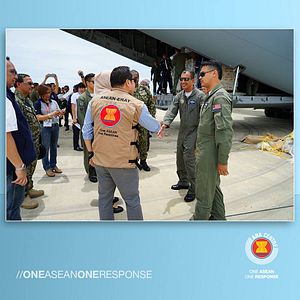Last week, the Association of Southeast Asian Nations (ASEAN) joined growing list of actors offering various forms of assistance to the Philippine government as it confronts Islamic State-linked militants in the southern city of Marawi. The move marked just the latest foray by the regional grouping to play a role in ongoing humanitarian crises in the region.
As I have noted before, as one of the world’s most disaster-prone subregions, Southeast Asia has been working on setting up new institutions to strengthen regional disaster relief capabilities (See: “US Group to Boost ASEAN Disaster Relief Capabilities”).
In 2011, the ASEAN Coordinating Center for Humanitarian Assistance on Disaster Management (the AHA Center) was set up in Jakarta to facilitate regional and international collaboration, with the Emergency Rapid Assessment Team (ERAT) brought to bear to provide dozens of rapidly deployable experts as well. And last September, at the 28th ASEAN Summit held in Vientiane, ASEAN leaders also signed an ASEAN Declaration on One ASEAN, One Response to achieve a faster and collective response to disasters.
The AHA Center has also been partnering with other organizations to preposition emergency supplies in ASEAN’s three regional logistics hubs in Malaysia, the Philippines, and Thailand, beginning with the Malaysian one in Subang.
Though not nearly as devastating as Cyclone Nargis in Myanmar in 2008 or Typhoon Haiyan in the Philippines in 2013, the Marawi crisis nonetheless has taken a toll on the Philippines. Recent government estimates indicate that since the siege began on May 23, about 400,000 civilians from Marawi and surrounding areas have been displaced. Data from the National Disaster Reduction and Management Office (NDRRMO) operations center indicates that as of July 21, there are 5,055 families (27,335 people) staying in 89 evacuation centers, while 98,846 families (442,981 people) are staying with friends or relatives in nearby areas.
As this grim picture has begun emerging, a growing list of countries have been mulling and offering various forms of assistance, with some being more public about it than others. This list includes not just countries within Southeast Asia like Singapore, Indonesia, and Malaysia or longtime allies and partners like the United States and Australia, but also others as well like India and China.
On July 21, ASEAN joined this list, albeit in a modest way. On July 21, the AHA Center began flying out some of its ASEAN relief items stored in the hub in Subang. The deployment was done with the support of the Malaysian government, which provided A400M military aircraft to facilitate the endeavor. According to the AHA Center, it handed over 600 family tents, 600 family kits, more than 3,000 personal hygiene kits, 600 kitchen sets, and four water filtration units.
“Today we witness the realization of the One ASEAN, One Response,” Adelina Kamal, the acting executive director of the AHA Center said in a statement. “In the spirit of ASEAN solidarity, we are supporting the government and the people of the Philippines in the form of ASEAN relief items. This is one of those moments where the vision of the One ASEAN One Response is no longer an imagination but a realization,” she added.
On the Philippine side, the relief items were received by Cesar B. Yano, the executive director of Task Force Bangon Marawi and the undersecretary of defense for defense operations; Judy Taguiwalo, the vice chair for disaster response and the secretary of the Department of Social Welfare and Development; and Kristoffer James Purisima, the officer-in-charge at the secretary of the Office of Civil Defense.
Yano praised the AHA center for its partnership with the DRRMC in dealing with such crises. But in a reminder of how dire the situation is in Marawi, he also admitted that true humanitarian assistance and disaster relief efforts could only begin once Philippine security forces had fully cleared the area.
































